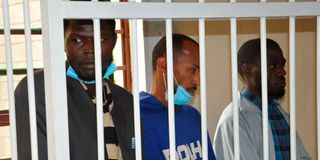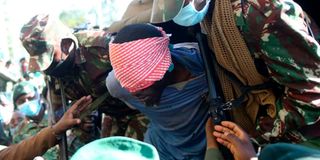Premium
A year on, officers who recaptured terror convicts yet to get Sh60m bounty

The three prisoners - Musharaf Abdalla Akhulunga, alias Shukri, Joseph Juma Odhiambo and Mohamed Abdi Abikar - were serving a cumulative term of 78 years. Right picture: Petero Kilonzi (centre) who led the capture of the three terrorists with his colleagues Gideon Mulei (left) and Joseph Kilunda on November 19, 2021. Sila Kiplagat | Nation Media Group
Security at Kamiti prison has been enhanced to prevent the escape of prisoners, with more focus on technological capacity.
In an interview with Nation, Brigadier (Rtd) John Warioba, the Kenya Prisons Service Commandant, who marks one year in office this month, said the management undertook to improve various aspects of security, including enhanced CCTV systems to boost round-the-clock surveillance.
“We have enhanced security not just in Kamiti prison but in all prisons countrywide, and now we have CCTV systems that can collect and store data for longer periods,” said the prison boss.
Previously, he said, the CCTV had gaps and insufficient data storage capacity, which made it difficult to review what had happened.
The changes were prompted by last year’s escape from Kamiti Prison of three terror convicts.
On Sunday, November 14, 2021, the CCTV cameras at the highly secured facility were not working and the malfunction was never reported. The new electronic surveillance aims to ensure that this never happens again and that the authorities are always in a position to know what is happening in the country’s correctional facilities.
The following day, Kenyans woke up to the news that three terror convicts had made a daring escape from Kamiti Prison.
The news that dangerous terrorists Musharaf Abdalla Akhulunga, aka Zarkarawi, aka Alex, aka Shukri, Mohamed Ali Abikar, and Joseph Juma Odhiambo, aka Yusuf, who were serving sentences for various terror crimes, flashed around the country that Monday morning.
Kenyans remembered with fear those terrible days of terror attacks and the havoc they had caused. Their dread was amplified by the story of how the three casually walked out of the heavily guarded facility.

From left: Musharaf Abdalla Akhulunga alias Zarkarawi, Mohammed Ali Abikar and Joseph Juma Odhiambo alias Yusuf who escaped from Kamiti Maximum Prison on November 14, 2021.
A massive manhunt for the three was launched across the country leading to their recapture in the Kamuluyuni area, a remote village in Kitui County, on the fourth day of their short-lived bid for freedom.
The escape has had a profound effect on all the people involved.
The then Commissioner-General of the Kenya Prison Service, Wycliffe Ogallo, was an immediate casualty, sacked by then President Uhuru Kenyatta, who replaced him with Brigadier Warioba.
Mr Ogalo, Kamiti Maximum Prison head Charles Mutembei, and several wardens were detained for questioning by officers from the Directorate of Criminal Investigations. The then Interior Cabinet Secretary Fred Matiang'i said the jailbreak was abetted by laxity and incompetence.
After an emergency security meeting chaired by Mr Kenyatta at State House, Dr Matiang’i announced that a Sh60 million bounty had been placed on the heads of the terrorists for any information leading to their arrest.

One of the three terror convicts, Joseph Juma Odhiambo, who escaped from Kamiti Maximum Security Prison after they were caught and brought back to the facility on November 18, 2021.
What happened to the three convicts who told the court during their trial that given another chance, they would not hesitate to try to escape again? According to Brigadier Warioba, they are in safe custody at the same prison. He said he was confident the three, or any other prisoner, could not beat the heightened security cordon around their cells.
The prison management may be content with the changes the prison escape wrought, but the Kenya Police Reserve (KPR) members who apprehended the terrorists are not a happy lot.
They lamented that they have long been forgotten by the government despite the risk they faced arresting the terrorists.
They did not receive a cent from the Sh60 million bounty promised by Dr Matiang'i for information leading to the arrest of the escapees.

Some of the police reservists who captured the terrorists at the scene of the arrest on November 19, 2021.
According to KPR officer Komu Kilonzi, his team not only provided information to security agencies but painstakingly tracked down and apprehended the terrorists, thus helping to keep the country safe.
The reservist recounted his face-off with the dreaded terror convicts that Thursday mid-morning, a dangerous encounter that was never appreciated by the government.
“Musharaf launched himself at me, his massive frame shooting through the air and hitting me in the ribs. We both fell to the ground as he fought to flee from being captured. Luckily, I got the better of him and pinned him to the ground,’’ recounted Mr Kilonzi.
His colleagues swiftly helped to handcuff Musharaf before giving chase in the thorny thicket to apprehend the other two. The KPR officers then telephoned police in Mwingi, who came to pick up the shackled escapees.
The convicts had told the KPR officers that they were in touch with people at Boni forest whom they described as well-endowed and who were ready to offer bribes in exchange for their freedom.
“They told us that kampuni yetu ni kubwa (our group is large), in reference to the Al Shabaab terror group, and that their masters would not hesitate to bail them out,” explained Jacob Mutisya, another KPR officer.
However, their heroic and patriotic acts were never recognised or appreciated by the government and now one year on, the team wonders what happened to the Sh60 million promised bounty. Some believe it must have been released, but ended up in other people’s pockets.
The least the reservists expected was that the government would recognise them with the Head of State Commendation besides the promised cash rewards.

Joseph Juma Odhiambo (center), one of the three terror inmates who had escaped from a high-security jail, disembarks from the police helicopter after they were arrested, following their escape from Kamiti Maximum Security Prison in Nairobi, November 18, 2021.
After the capture and return to prison of the convicts, Dr Matiang’i declined to be drawn into a discussion on who would get the bounty after questions were raised by the media.
“No! no! no! We are not going there. Let us not be speculative about this. We are going to work on this as meticulously as my colleague has said,” said Dr Matiang’i, speaking at Kamiti Prison.
Efforts to reach Dr Matiang’i’s successor at Harambee House, Prof Kithure Kindiki, for answers on the matter failed as his phone went answered and he did not respond to text messages.
The three prisoners, described by security agencies as dangerous, were tried and convicted for escaping from lawful custody and are now serving an additional two years in jail.
Under Kenyan law, escaping from prison is a misdemeanour, punishable with a term not exceeding two years or a fine or both.
Abikar is serving the longest term, 41 years, for his role in the Al Shabaab attack on Garissa University College in April 2015. The attack killed at least 148 people, most of them students. He started serving the sentence in July 2019.
Musharaf is serving 22 years for attempting to attack Parliament buildings in 2012. He was found at a Malindi hotel in possession of explosives, two firearms, and 400 rounds of ammunition. He had rented several houses in Nairobi, including in Lang’ata, Umoja, Embakasi, and Eastleigh.
He started serving the sentence in 2017. He is also known by several aliases – Sharrif Abdallah Mualim, Alex Shikanda, Rashid Swaitan, Ali, Bonie, and Blacky.

Two of the three terror convicts who escaped from Kamiti Maximum Security Prison.
Odhiambo is serving 15 years for travelling to Somalia, failing to report his departure to an immigration office, and exiting Kenya through an illegal point.
Ten warders, including the Kamiti prison boss, Mr Mutembei, and his deputy, Joseph Loklari, were arrested by Anti-Terror Police Unit shortly after the President revoked Mr Ogallo’s appointment as the head of the Kenya Prisons Service.
Four senior warders – Pamela Cherubet, Peter Thuku, Lilian Mukasia, and Nicholas Otieno – were arrested and charged in court with aiding three terror convicts to escape from prison.
Earlier, the National Intelligence Service had reportedly uncovered a suspicious money trail and communication involving some officers at Kamiti.





